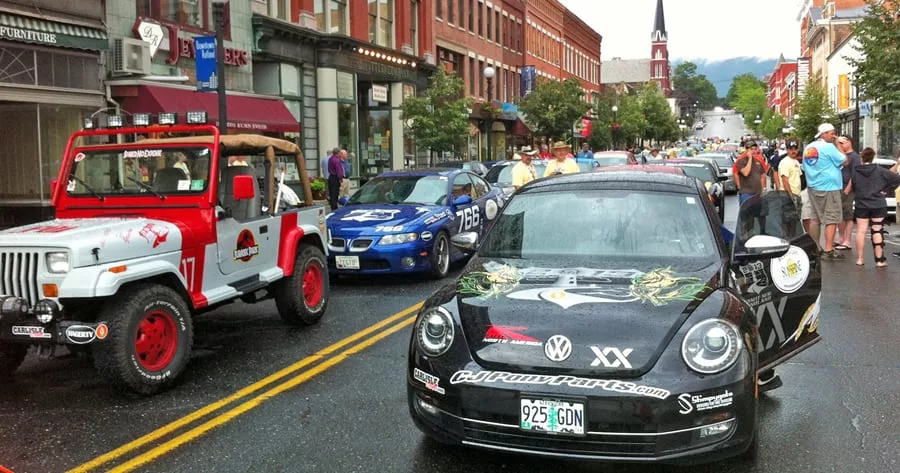
Home » Rally North America cars, drivers rally into Kennewick
Rally North America cars, drivers rally into Kennewick

June 15, 2016
By Jeff Morrow for TCAJOB
Mid-Columbians who love cars will get a treat in July when Rally North America makes a stop in Kennewick as part of its Big Sky Rally.
Eighty cars with drivers and navigators from 31 states and three Canadian provinces will line up for the event.
[blockquote quote="It’s more of a scavenger hunt on wheels." source="Tony Intrieri, Rally North America's volunteer operations manager" align="right" max_width="300px"]
Rally North America has one premier event each year. This year’s five-leg, 1,600-mile scavenger hunt begins in Billings, Mont., and ends in Portland, Ore.
The legs go from Billings to Big Sky, Mont.; then to Great Falls; then to Kellogg, Idaho; on to Kennewick; and finally, Portland, Ore.
Competitors will roll into Kennewick the night of July 14.
Friday, July 15, teams will start the final leg from downtown Kennewick, heading to the finish line in Portland. That start will be on Kennewick Avenue between Dayton and Auburn streets between 7:30 and 9 a.m.
“We line them up, a local spokesperson addresses the group, then we send them out two to three cars at a time,” said Tony Intrieri, Rally North America’s volunteer operations manager. “We wait a few minutes and then send another few cars out.”
The local spokesperson addressing the group at the start in this case will be Kennewick Mayor Steve Young.
“The cars vary,” Intrieri said. “We had an Alfa Romeo one year. This year one guy is going to drive a drift car the whole way.”
The stop in the Tri-Cities will provide an economic boost for local businesses.
“We’re renting hotel rooms. We’ll need gas and have to eat,” said Intrieri. “We’ll have 160-ish people here.”
He also said many competitors come through an area, then return later on their own to spend more time in that region.
The Rally North America group keeps its costs low.
“A lot of people do what we do, like the Gumball Rally or the Cannonball,” said Intrieri of the events that were big enough that movies were made about them.
But those events can cost a team thousands of dollars to enter.
“Ours costs $500,” he said. “We wanted to do something that anyone could enter.”
But just what is a rally?
It’s a race, but not in the purest sense.
It’s a chance for auto enthusiasts to get together to enjoy their hobby, and at the same time help a charity.
Each year since Rally North America started its rallies in 2009, the group has selected a charity to give the proceeds.
This year, Camp Sunshine is that charity.
Camp Sunshine is a retreat in the state of Maine for children with life-threatening illnesses and their families.
There is a certain prestige for the rally group in starting each leg first.
“Usually the team that raises the most money for charity gets to start first,” Intrieri said. “We’ve had people who raised $11,000 just so they could be first out.”
But just because a team is first out doesn’t mean it’s going to win.
“It’s more of a scavenger hunt on wheels,” Intrieri said.
Think about the television show The Amazing Race, with a car.
Competitors get clues and have to figure out where to go.
Once, in Alaska, competitors had to find a musk ox farm and get their picture taken with their cars. They get points for each checkpoint completed.
Intrieri starts almost a year in advance trying to work with places for checkpoints.
“For instance, one checkpoint might be if you stop in and get a receipt at this barbecue place, we’ll give you a half-hour off of your time,” he said.
He has to be careful to watch for teams cutting corners.
For instance, the whole team has to be in the time-stamped picture of certain clues.
“That’s because some teams used to split up and get all of the pictures, cutting their time in half,” Intrieri said.
Teams can be disqualified by arriving at the day’s final checkpoint too early, or if they get a ticket from law enforcement.
The winner, says Intrieri, completes the route in the shortest amount of time, without breaking the rules.
One couple won a rally a few years back while driving a 1987 Mercedes.
“It had a 20-gallon gas tank and got 400 miles a tank,” Intrieri said. “They didn’t have to stop for gas. They were runners and they stopped at each checkpoint quickly. If you don’t stop for gas or to eat and just go, go, go, you can win.”
Intrieri says this is the first time this group has come through the Northwest, and he’s excited.
“It’s one of the places we haven’t been to and we felt we needed to do.”
Local News
KEYWORDS june 2016





